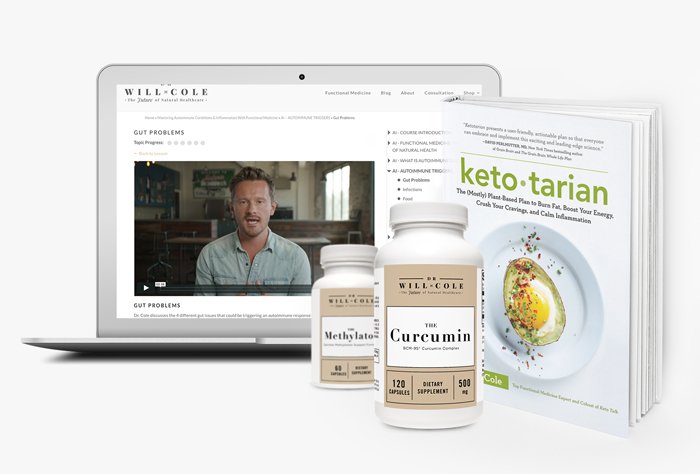The Most Common Wellness Mistakes Even The Healthiest People Make

A lot of my patients practice good health habits. They don’t eat much junk food, they avoid artificial sweeteners, they exercise….and yet, they still have health issues they can’t seem to get ahead of. They’ve already tried all the obvious moves, but they have underlying health problems like adrenal fatigue, thyroid issues, digestive disorders, or autoimmune-inflammatory conditions that interfere with their lives. So why aren’t their healthy habits working?
For all you clean eaters and fitness lovers out there, if your health still isn’t where you want it to be, here are some common mistakes I find that even the most health-conscious people are making:
Article continues below
Make Your Life a Cleanse
SUBSCRIBER-ONLY GUIDES FOR GUT HEALTH, VIBRANT ENERGY, HEALTHY FOOD & CLEAN ALCOHOL
Get FREE access to these + giveaways, recipes, & discount codes in personal emails from Dr. Will Cole.
1. Eating the wrong healthy foods for your body
In functional medicine we understand that what works for one person may not work for the next. Because of food sensitivities and underlying gut problems, I see many healthy eaters unintentionally stressing out their bodies with foods that don’t agree with their individual bodies. Trying out an elimination diet can be a simple way for you to take charge of your food and figure out exactly what your body loves and hates.
2. Using too many natural sweeteners
Just because they are “natural” doesn’t mean you can use sweeteners all day long. Many natural sweeteners are less natural than they seem, or simply aren’t good for you. For example, agave nectar is a popular natural sweetener that is often touted as a better option because it is considered low-glycemic. The problem is that agave is mostly fructose, which can put strain on your liver. Eating agave nectar frequently can contribute to fatty liver disease and insulin resistance.
As for no-calorie natural sweeteners like stevia and xylitol, it matters what you buy. The white powdered form of stevia is chemically altered and often contains additives. Xylitol and monk fruit can contribute to digestive problems. Even raw honey and maple syrup can be hard on your blood sugar balance and encourage more fat storage if used in large quantities. For all these reasons, it’s important to use even natural sweeteners in moderation. Shoot for no more than 2 tablespoons per day.
3. Stressing out about your diet
It’s smart to choose clean, nutritious food, but if it becomes an obsession, what is healthy can turn just the opposite. If you feel anxious and constantly overthink your diet, it becomes detrimental to your health. Putting yourself in a constant state of stress is counterproductive. You can eat kale and drink kombucha all day, but if you’re also serving yourself a giant slice of stress it can affect almost every system of your body.
Stress has been implicated in chronic health issues such as autoimmunity, brain problems, adrenal fatigue, and gut issues. If you find yourself consumed with stress and anxious thoughts about food, incorporating a mindfulness practice into your regular wellness routine will help bring some calm back into your life.
4. Overexercising
We all know how important exercise is in any wellness routine. It increases circulation, strengthens muscles, helps restore energy, and boosts your mood. However, like everything else, too much of a good thing can become a bad thing. After a workout, muscle fibers need time to recover and repair. Not giving them healing time is a stressor on your body. It can increase inflammation throughout the body, which in turn, can affect the immune system and can contribute to adrenal fatigue.
A good rule of thumb for determining appropriate recuperation time is to give yourself a full one to two days off each week. The more strength training and lifting you are doing, the more time you will require between each session. Listen to your body, and potentially work with a personal trainer to determine what’s right for you.
5. Not sleeping enough
It’s great to check off all the boxes on your ever-expanding to-do list, but when you sacrifice sleep to get it all done, you aren’t doing yourself any favors. Even practically-perfect health habits will be undermined by lack of sleep, which is your body’s repair-and-rebuild time. To get more sleep and better quality, begin winding down a good hour or two before you plan on actually being asleep. Turn off electronics or wear blue-light-blocking glasses, which help relax the eyes and facilitate melatonin production, to promote better rest. You can finish those dishes…or that deadline…in the morning.
6. Eating the same thing all the time
Every single food has a vastly different combination of nutrients. By limiting yourself to a group of only your favorites, you’re also limiting the hundreds of awesome superfoods and the benefits that they provide. By rotating your fruits, vegetables, and protein options, you are exposing yourself to different nutrients and helping to keep your immune system balanced, which can help heal and reduce food sensitivities. Trying a couple of new vegetables each week can increase your nutrient intake and give you more options to choose from.
7. Overdoing protein
Amino acids regulate your metabolism and balance your immune system. You need them, in the form of dietary protein, because your body doesn’t produce everything you need. However, too much protein can also have side effects, such as (surprisingly) increasing your blood sugar levels and even contributing to cancer risk. I suggest limiting protein to 40 to 70 grams per day, depending on your lean body mass.
8. Overdoing carbs (including the good ones)
Who doesn’t love potatoes? Problem is, these and other carb-heavy vegetables, are quickly converted to glucose in your body. When you eat too many carbs, even when they are nutrient-dense, you could wind up with a blood sugar problem. Make sure you are still rotating your vegetables and put your emphasis on dark leafy greens and sulfuric vegetables such as broccoli, cabbage, onions, and mushrooms. These will provide your body with essential nutrients for methylation and open up detox pathways without the blood sugar backlash.
9. Drinking too much alcohol
Being strict with your health is great as long as you don’t also have a major blind spot. Too often do I see patients doing everything “right” but continuing to hold on to alcohol. While it may seem harmless to indulge in a few drinks on the weekend with some friends, doing this on the regular can contribute to chronic inflammation and underlying gut problems like leaky gut syndrome. In many cases I have seen, alcohol is the missing link between lifestyle and chronic health problems in otherwise diligent people. Some solutions are to switch it up with mocktails and adaptogenic elixirs and be particular with the alcohol you do choose to consume. Red wine for example, in moderation, has been shown to reduce inflammation (1) in some people.
10. Over-supplementing
Supplements can replace what you are missing (like vitamin D or B12) or give you a boost in an area where you need it. However, if you take a lot of different supplements that aren’t necessarily what you need this could actually perpetuate certain health issues. Plus, who really wants to take more supplements if it’s not necessary? That can get expensive! Swallowing too many capsules can also be rough on your digestive system. Take only what you know you need, or work with a functional medicine doctor to find out exactly what your body needs to thrive so you can be as targeted and specific as possible about supplements.
11. Eating too many high lectin-containing foods
Lectin and phytates are natural proteins found in legumes such as beans, chickpeas, grains, diary, nuts, and seed that can trigger inflammation and add to digestive distress for some people. Nightshade plant foods like tomatoes, peppers, potatoes, and eggplants are also full of lectins and can drive up inflammation for some people. All of these are healthy whole foods, but that doesn’t mean they are optimal everyone. Working with a functional medicine practitioner can help you find out exactly what foods work for you.
As one of the first functional medicine telehealth clinics in the world, we provide webcam health consultations for people around the globe.
Photo: Stocksy
Start Your Health Journey Today
FUNCTIONAL MEDICINE CONSULTATIONS FOR PEOPLE AROUND THE WORLD
References:
Shop This Article
Purchase personally curated supplements
and Dr. Will Cole’s books!

The information on this website has not been evaluated by the Food & Drug Administration or any other medical body. We do not aim to diagnose, treat, cure or prevent any illness or disease. Information is shared for educational purposes only. You must consult your doctor before acting on any content on this website, especially if you are pregnant, nursing, taking medication, or have a medical condition.
Our articles may include products that have been independently chosen and recommended by Dr. Will Cole and our editors. If you purchase something mentioned in this article, we may earn a small commission.

BY DR. WILL COLE
Dr. Will Cole, DNM, IFMCP, DC is a leading functional medicine expert who consults people around the globe, starting one of the first functional medicine telehealth centers in the world. Named one of the top 50 functional and integrative doctors in the nation, Dr. Will Cole provides a functional medicine approach for thyroid issues, autoimmune conditions, hormonal imbalances, digestive disorders, and brain problems. He is also the host of the popular The Art of Being Well podcast and the New York Times bestselling author of Intuitive Fasting, Ketotarian, Gut Feelings, and The Inflammation Spectrum.

Gut Feelings
Healing The Shame-Fueled Relationship
Between What You Eat And How You Feel
